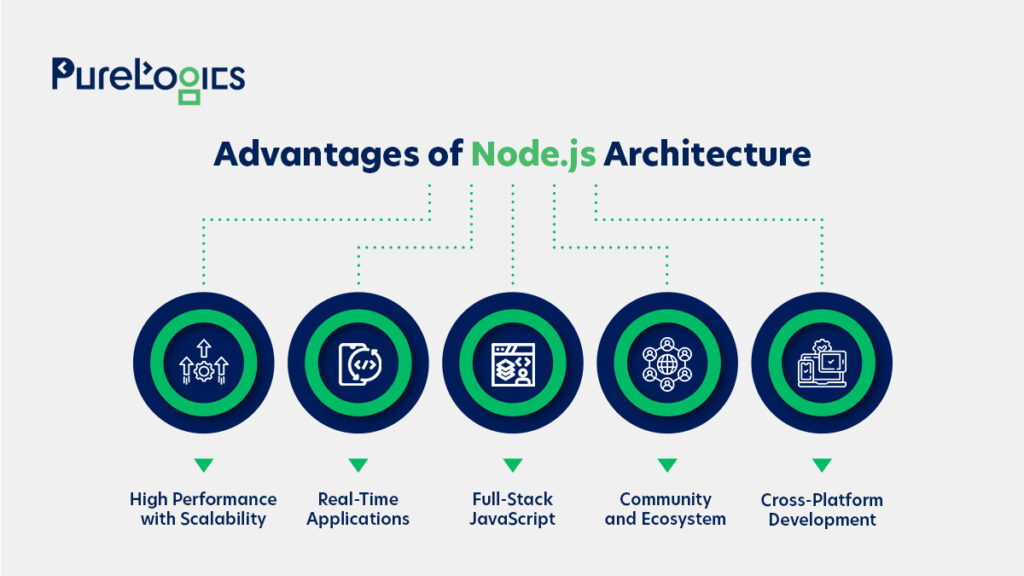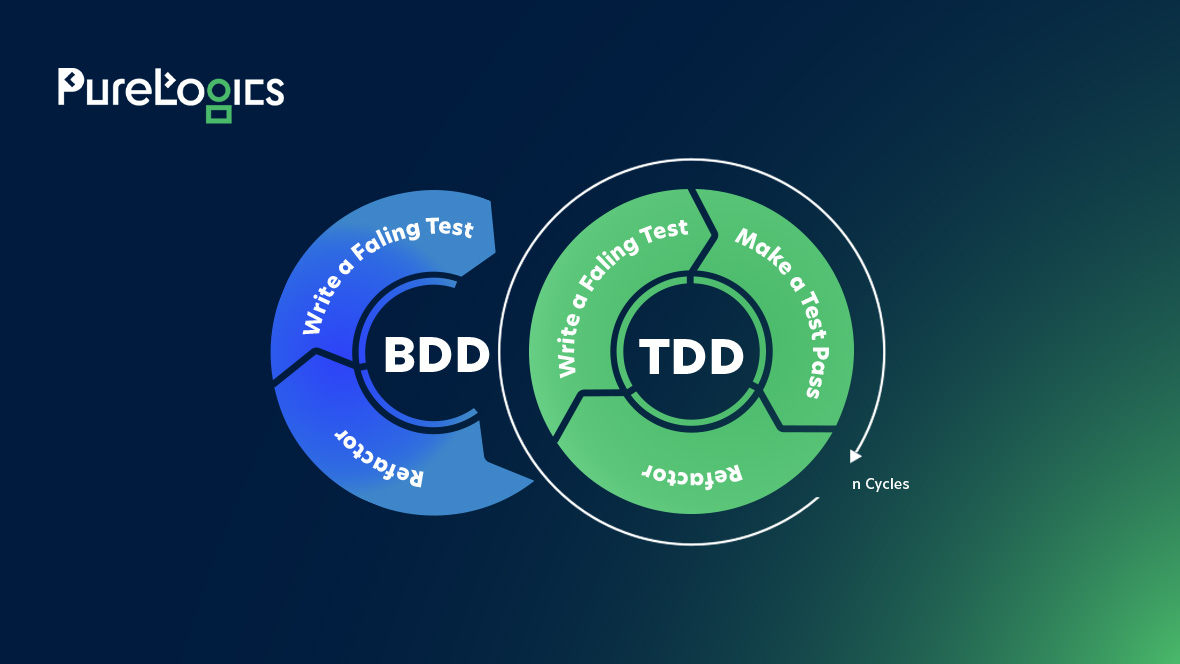Node.js has quickly emerged as one of the most preferred platforms for building scalable, fast, and reliable web applications. With its non-blocking, event-driven architecture and powerful execution of JavaScript on the server side, it has revolutionized the way developers create applications. Whether you’re working on a small web app or a complex, real-time application, Node.js stands as a top choice for developers and businesses alike.
In this blog post, we’ll explore the architecture of Node.js and why it is a prime choice for today’s website and app development projects. So, without any further ado, let’s start reading!
What is Node.js?
Node.js is an open-source, cross-platform JavaScript runtime environment that allows developers to execute JavaScript code outside the browser. Built on Google Chrome’s V8 JavaScript engine, Node.js provides a robust foundation for server-side scripting, making it ideal for developing scalable network applications.
Node.js simplifies full-stack development by allowing developers to use JavaScript both for client-side and server-side operations. This integration reduces the learning curve for developers and speeds up development cycles. Moreover, Node.js has a massive ecosystem of libraries and tools, further enhancing its flexibility and capabilities.
Accelerate Development with Node.js
Leverage the power of full-stack JavaScript for faster, more efficient project delivery.
Architecture of Node.js
The true power of Node.js lies in its architecture, which is fundamentally different from the traditional multi-threaded request/response architectures found in languages like PHP, Python, or Ruby.
a) Single-Threaded Event Loop
The cornerstone of Node.js architecture is its single-threaded event loop. Unlike conventional platforms that spawn a new thread or process for each request, Node.js uses a single thread to handle multiple client requests concurrently. This is possible through its event-driven model, which enables asynchronous I/O operations.
This architecture dramatically reduces the overhead associated with thread management and memory consumption. The single-threaded nature ensures that Node.js applications are lightweight and extremely efficient, even under high loads.
b) Non-Blocking I/O
Node.js adopts a non-blocking, asynchronous I/O model. In a traditional blocking I/O model, if a server encounters an I/O operation, such as reading from a file or database, it has to wait until that operation completes. In contrast, Node.js doesn’t block the execution of I/O tasks. Instead, it offloads the I/O operations to the system and continues processing other tasks. Once the I/O operation completes, a callback function is executed.
This non-blocking I/O architecture ensures that Node.js can handle a large number of simultaneous connections without overloading the server.
c) Asynchronous Event-Driven Programming
Node.js uses an event-driven programming model where events are triggered and handled as they occur. The event loop continuously monitors the event queue for any events that need processing, while callbacks are queued up to be executed once the events are complete.
The event-driven architecture allows Node.js to manage multiple requests efficiently and enhances the application’s responsiveness, making it suitable for real-time applications such as chat apps, online games, and collaboration tools.
Advantages of Node.js Architecture

The design choices behind Node.js give it several advantages that make it a top choice for many projects. Let’s explore some of these advantages:
High Performance with Scalability
Node.js’ single-threaded event loop architecture and non-blocking I/O make it highly scalable. Node.js can handle thousands of simultaneous connections with minimal overhead, which makes it an excellent choice for applications that require high throughput, such as real-time messaging or live streaming services.
The ability to scale horizontally across multiple servers or processes ensures that your application can grow in size and complexity without sacrificing performance.
Real-Time Applications
The event-driven nature of Node.js makes it a natural fit for real-time applications like chat platforms, online gaming, video conferencing, or live data feeds. Since Node.js can handle multiple I/O operations asynchronously, it excels in environments where multiple real-time connections need to be managed concurrently.
Full-Stack JavaScript
One of the unique advantages of Node.js is its ability to use JavaScript on both the client and server sides. Developers no longer need to juggle different languages for the front-end and back-end. This simplifies the development process and improves collaboration within teams. Full-stack JavaScript development also accelerates project timelines, ensuring faster deployment of applications.
Community and Ecosystem
Node.js has a vibrant and growing community. With the popularity of Node Package Manager (NPM), developers have access to thousands of libraries, frameworks, and tools that can be easily integrated into projects. The rich ecosystem significantly speeds up development cycles by reducing the need to write everything from scratch.
Cross-Platform Development
Node.js supports cross-platform development, making it ideal for building apps that need to run on various operating systems. Tools like Electron.js leverage Node.js to build desktop applications with a single codebase, ensuring compatibility across Windows, Mac, and Linux.
Bring Real-Time Capabilities to Your Application
Power up your project with Node.js to handle real-time interactions effortlessly.
Use Cases of Node.js
Node.js has been adopted widely across industries, from startups to tech giants, for a variety of applications. Let’s examine some popular use cases:
Real-Time Chat Applications
One of the most common use cases of Node.js is in real-time chat applications. With its non-blocking architecture, Node.js handles real-time messaging across thousands of connected users with ease. Popular messaging platforms like Slack and WhatsApp have adopted similar technologies to scale their services.
Single Page Applications (SPAs)
Node.js plays an essential role in building single-page applications (SPAs), where the entire app is loaded once, and new data is dynamically fetched as needed. Its asynchronous nature allows SPAs to perform well by reducing the load on the server.
Microservices Architecture
Node.js fits perfectly into a microservices architecture. It allows developers to build small, lightweight services that communicate with each other over networks, providing a scalable and modular approach to application development. Companies like Netflix, PayPal, and Walmart use Node.js for their microservice-based architectures.
API Development
Thanks to its lightweight nature and ability to handle a large number of requests, Node.js is widely used for building APIs. With Express.js, a popular framework for Node.js, developers can quickly set up robust, high-performance APIs.
Why Node.js is a Top Choice for Your Project
Node.js has proven itself to be an incredibly versatile platform. Its non-blocking I/O and event-driven architecture make it a natural fit for real-time, scalable applications. Whether you’re building a social media app, a real-time chat service, or a large-scale eCommerce platform, Node.js offers the tools, performance, and community support to deliver efficient, scalable solutions.
Here are some key reasons to choose Node.js for your next project:
Spure: Thanks to the V8 engine and event-driven model, Node.js apps are fast and efficient.
Scalability: With support for microservices, horizontal scaling, and non-blocking I/O, Node.js scales seamlessly.
JavaScript Everywhere: Use a single language for front-end and back-end, which simplifies development and maintenance.
Rich Ecosystem: Access to a wide range of open-source libraries and tools via NPM.
Real-Time Capabilities: Perfect for applications requiring real-time communication, like messaging apps or collaborative tools.
Final Remarks
Node.js architecture stands out as one of the most efficient and scalable options available today. Its single-threaded, event-driven model ensures that your application can handle large-scale traffic and real-time interactions without compromising performance. The ability to use JavaScript throughout the entire stack makes it easier for teams to collaborate and accelerate project delivery.
At PureLogics, we specialize in harnessing the power of Node.js to build robust, scalable web and app solutions tailored to your business needs. Whether you’re starting a new project or scaling an existing one, our team of expert developers is ready to help you succeed.
Contact us today to learn how we can bring your vision to life with top-notch web and app development services.


 [tta_listen_btn]
[tta_listen_btn]
 November 8 2024
November 8 2024






